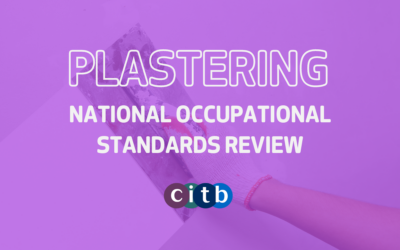
by Clair Mooney | Apr 26, 2024 | Contractual and Legal, Employment
For new workers the Government has announced a number of changes to the Points‐Based Immigration System (PBIS). These seem to be designed to reduce overall net migration and do make it harder for FIS Members to engage overseas workers. The key changes are outlined below.
Workers need to earn more than under the old system
The earning threshold for the Skilled Worker visa has risen from £26,200 to £38,700, as well as raise the Immigration Health Surcharge from £624 to £1,035. The Shortage Occupations List will also be replaced with a new ‘Immigration Salary List’, which retains a general salary discount but includes fewer occupations (plastering and drylining is not on the list, they culled most of the construction workers on the grounds they want to incentivise the industry to do more to recruit and train local people).
Under the PBIS, most workers from outside the UK in construction are required to be ‘skilled workers’ and require a Skilled Worker visa to work in an eligible occupation.
Build UK have produced a helpful flow chart here to show how it now works in terms of gaining sufficient points
Employers need to pay more than under the old system
The Home Office has increased the fees for most types of visas, including the ‘Skilled Worker’ visa used by most workers from outside the UK in construction.
- For those applying for a visa from outside the UK, the fee is £719 for up to three years and £1,420 for more than three years.
- For those already in the UK extending, switching or updating their visa, the fee is £827 for up to three years and £1,500 for more than three years.
- For occupations on the Immigration Salary List (which has replaced the Shortage Occupation List), the fee is £551 for up to three years and £1,084 for more than three years, regardless of whether applying from in or outside the UK.
The fine for employing illegal workers has increase from £15,000 to £45,000 per illegal worker for a first offence and from £20,000 to £60,000 for repeated offences. More on the fees here.
Right to work checks are still important
Depending on the individual, employers have the following options for ensuring they have right to work in the UK: a digital check via a certified Identity Service Provider, an online check via the Home Office online service, or an in‐person manual document‐based check.
FIS is working with Migrate UK to help members navigate the changes. Migrate has produced specialist guidance for FIS Members (including a great webinar hosted for FIS Members: “How to hire skilled workers from the Global Talent Pool”) and the free consultation and discounted services available exclusively to FIS Members through this relationship here.

by Clair Mooney | Apr 26, 2024 | Building Safety Act
FIS attended a Building Safety meeting earlier this week where Andrew Moore, Head of Operations Planning and Building Control at the Building Safety Regulator (BSR), and Martin Taylor, Executive Director at Local Authority Building Control (LABC), gave a unique insight into the latest phase of the Building Safety Regime from 6 April. Key points raised were that:
- The vast majority of Gateway 2 applications are for refurbishment and there are more small scale works in HRB’s than the regulator was anticipating.
- When applying for Building Control Approval, the Building Regulations compliance statement needs to contain a clear ‘narrative’ setting out how the e planned work will meet Building Regulations, including the guidance or standards used.
- Local Authority Building Control (LABC) is no longer able to provide pre‐planning advice in relation to applications for Higher‐Risk Building (HRB) projects where it would create a conflict with its role in providing building control services; however, it is anticipated that LABC will continue to signpost to best practice guidance.
- The role of Principal Designer should be undertaken by a lead designer who has authority over design decisions and is able to co‐ordinate the design work and challenge the design team to ensure all designs comply with relevant Building Regulations. In the event of a change in Principal Designer, there is a formal handover process within the regulations (section 11O) that must be followed.
- There is a need to clarify the requirements for hospitals and care homes at different stages of the HRB regime, for example whether Gateway Three approval is required before wards can be reoccupied after refurbishment work.
In a separate meeting with representatives of Building Control and the Design Sector, FIS were involved in discussions focussed on challenges in the design process. Confusions around the difference between offering design advice and being classified as a designer remain. It is critical that companies are clear on the extent of any design liability and adhere to the design control process when making decisions (beware the site fix). The other key part of the discussion was around what is Regulated Works and therefore when work in a HRB needs to be notified to the Building Safety Regulator and challenges around partial completion strategies that support phased occupation.
Other Building Safety News
In a written statement to Parliament last week, Secretary of State for Levelling Up, Housing and Communities Michael Gove confirmed that the new guidance on second staircases, which is intended to “provide additional capacity to reduce congestion, support egress and facilitate additional access for firefighting and rescue”, will apply nationally.
If you have any questions around the Building Safety Act, don’t hesitate to call FIS on 0121 707 0077 or email info@thefis.org and we’ll get back to you asap.
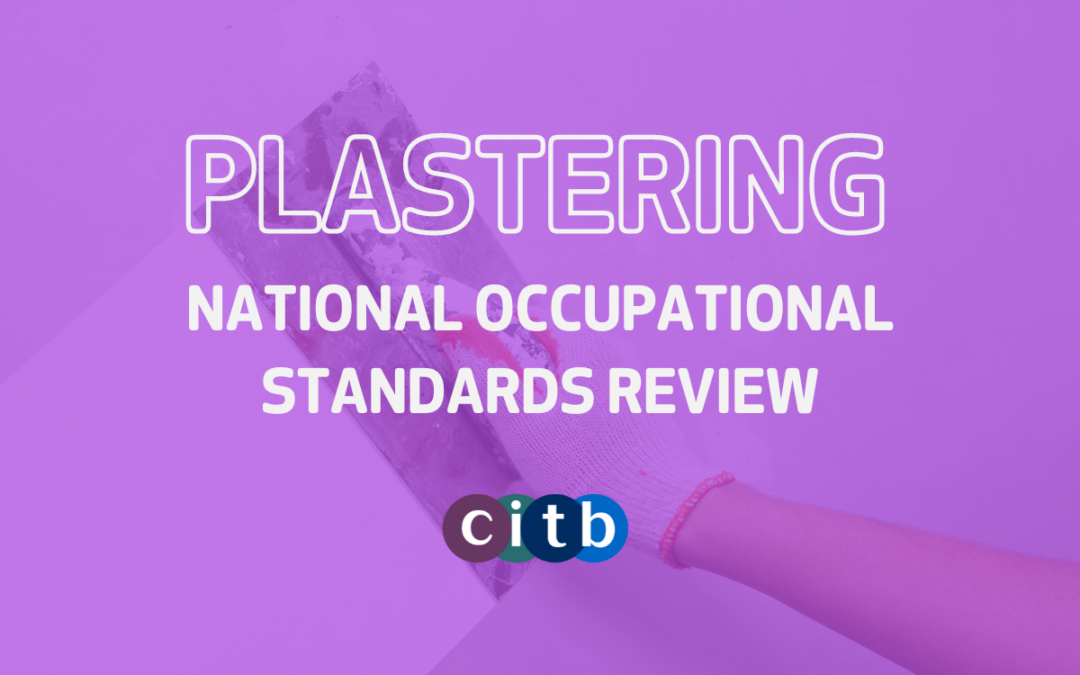
by Clair Mooney | Apr 18, 2024 | Skills
CITB is looking for plasterers or construction employers in the plastering industry to help shape the future of this occupation. Individuals will join CITB’s Plastering – National Occupational Standards (NOS) review group to:
Develop NVQ and SVQ qualification structures for Plastering
Ensure your employer voice is heard
Shape the future of the Plastering
If you are interested in getting involved, complete this short form to register your interest https://forms.office.com/e/QiNRz99VqV or contact standards.qualifications@citb.co.uk
For more information please visit National Occupational Standards (NOS) – CITB

by Clair Mooney | Apr 18, 2024 | Main News Feed
Build UK has recently updated its guide to the Building Safety Regime to include all the information published in connection with the latest phase of the regime from 6 April.
The April 2024 version includes the new registers for Building Control Approvers and Building Inspectors and updates to Approved Document B, including guidance for second staircases in new residential buildings above 18 metres in height. Build UK has also produced an overview of the Golden Thread which is available to FIS members, summarising the new requirement to collate and store information for Higher‐Risk Buildings (HRBs), and the timeline shows at a glance when all the key changes take effect.
Homes England has launched the Building Remediation Hub which allows applications for the Building Safety Fund and the Cladding Safety Scheme to be processed via a single portal. The Building Safety Fund covers the replacement of unsafe non‐ACM cladding systems on residential buildings 18 metres and over in height in London, whilst the Cladding Safety Scheme funds the replacement of unsafe cladding systems on residential buildings over 11 metres (11 ‐ 18 metres in London).
Following publication of the fourth report by the Industry Safety Steering Group, Chair Dame Judith Hackitt has released a blog reflecting on the ‘huge progress’ to date and urging the industry to continue to work together to ensure the new regime is a success. The Grenfell Tower Inquiry has confirmed that publication of its Phase 2 report has been delayed and will now be published after the next anniversary of the fire in June.
Source: Build UK
Get to grips with the Building Safety Act with the new FIS E’Learning Course: An Introduction to the Building Safety Act

by Clair Mooney | Apr 15, 2024 | Main News Feed
The Office for Product Safety and Standards (OPSS), the UK’s regulator for construction products, has organised a webinar to help industry better understand the Building Safety Act and the role of the OPSS.
The webinar, scheduled for 10am – 12noon on 22 April, will be chaired by Peter Caplehorn, CEO of the CPA and co-chair of the CLC’s Building Safety workstream, and includes Louise Barr, Deputy Director Construction Products DLUHC, Duncan Johnson, Deputy Director Construction Products OPSS, and Adam Turk, CEO of Siderise and future Chair of the CPA.
To register for the free event, please follow this link.

by Clair Mooney | Apr 12, 2024 | Main News Feed
The Building Safety Act (BSA) is the most significant piece of new legislation for construction in a generation. It will fundamentally change the way in which buildings are designed, constructed and maintained. It heralds a new regulator, regulates for competence, adds additional rigour to enforcement, calls for more detailed records to be kept of what was built, by whom and how and introduces compliance Gateways for Higher Risk Buildings.
Whilst the Act itself was introduced in 2022, the 6 April 2024 marked the end of the transitional periods and the new regime is now fully in force. This includes amendments to the core Building Regulations and a suite of new secondary legislation with new defined responsibilities for all working on the design and construction of buildings, new regulatory procedures and enforcement powers and tighter processes (the Gateways) for Higher Risk Buildings.
In the first operating week FIS has launched a new online training course designed to introduce the basic concepts of the Building Safety Act and support individuals working in the finishes and interiors sector understand the implications of these changes on them. Members have access to this course, which has been designed to be user-friendly and guide members through the new compliance landscape. The course is divided into nine chapters:
- An overview of the Building Safety Act 2022
- What is a Higher Risk Building and when does work fall under the stricter regime?
- An introduction to Gateways and new expectations
- PEOPLE: Duty Holders and Competence Management Plans
- PROCESS: Change Control and Mandatory Occurrence Reporting
- PRODUCT: Safety Critical Products and Evidencing Performance
- Managing the Golden Thread
- Defective Premises Act and other Sanctions
- Summary and Recommended Actions
It includes with an end test and FIS will issue CPD certificates to those completing the course (and passing the test). Learners can learn at their own pace and FIS is on hand to answer any questions that arise.
Commenting on the launch of the course, FIS CEO Iain McIlwee stated:
“This is a really important new chapter for our industry and we hope that this course helps members turn the page effectively. The advantage of delivering it in this way is that the content is agile and we can evolve as we learn more about the regulations are being applied in the real world. There remains some uncertainty and undoubtedly there will be some challenges as the rubber hits the road and the new enforcement regime beds in. As well as encouraging members to take the course we are inviting feedback and hopefully it will generate a wave of questions that we can help clarify and/or work to find the answers with the regulator.”
Members can register for the course here.
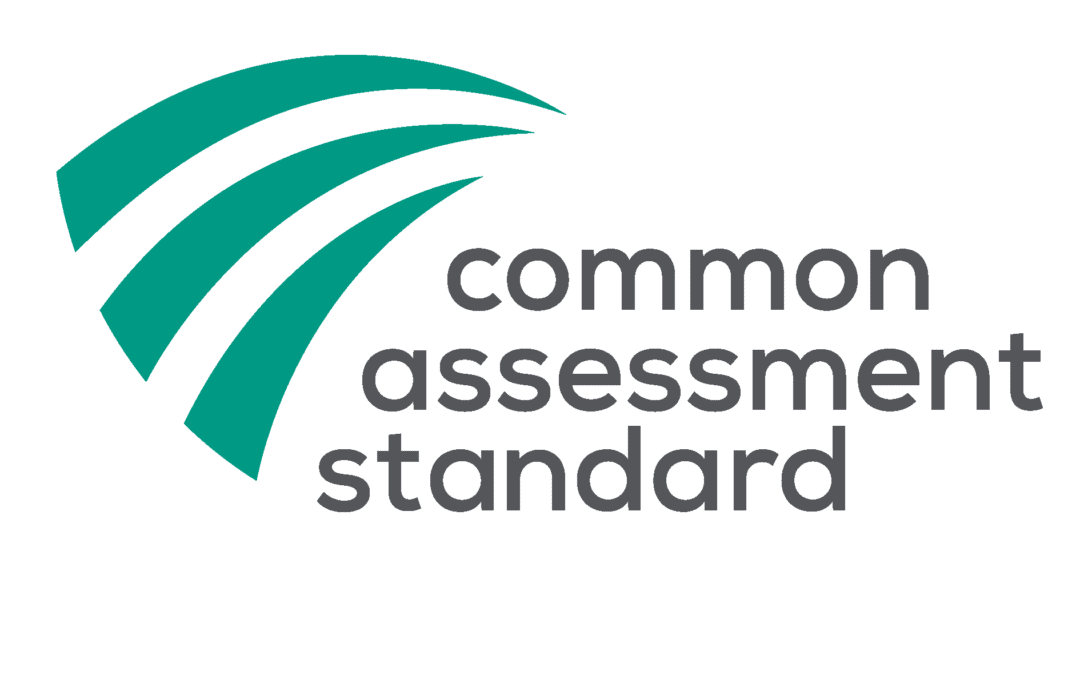
by Clair Mooney | Apr 11, 2024 | Main News Feed
The Cabinet Office has published Procurement Policy Note 03/24 which removes reference to PAS 91 meaning the Common Assessment Standard should now be used across the public sector. Following the withdrawal of PAS 91 by BSI last year, central Government departments and wider public sector bodies can only use the Common Assessment Standard for pre‐qualifying suppliers for construction works contracts. The changes to the PPN must be implemented by contracting authorities within three months, and it is another significant step forward for the Common Assessment Standard, which will help to reduce duplication for the supply chain whilst streamlining public sector procurement.
The Common Assessment Standard has reached a tipping point over the last 12 months, with a growing list of contractors and clients specifying it and more than 18,500 companies certified against it by five Recognised Assessment Bodies. It is also being updated to ensure it can be used to demonstrate companies have the organisational capability to fulfil their roles under the Building Safety Act.

by Clair Mooney | Apr 10, 2024 | Main News Feed
CITB has set up a ‘New Entrant Support Team’ to assist registered members with taking on Apprentices and new entrants from inception to completion and will cover
Recruitment
The team will signpost you to useful employment resources and help advertise your apprenticeship vacancy on Talentview to attract potential candidates and let them find you – all for free, helping you get the right apprentice.
CITB Funding
The team will ensire you’re set up to receive CITB apprenticeship grants:
• Attendance grant: £2,500 (per year, per apprentice)
• Achievement grant: £3,500 (on successful completion of the apprenticeship).
Admin/paperwork (including Government Funding)
You will receive help with the paperwork, liaising with the training provider, setting up your Government Digital Account and more so you can focus on the job.
Retention
The team will keep in touch to make sure you have the support you need to help your apprentice achieve and become a fully-fledged employee on completion.
More information is available here.
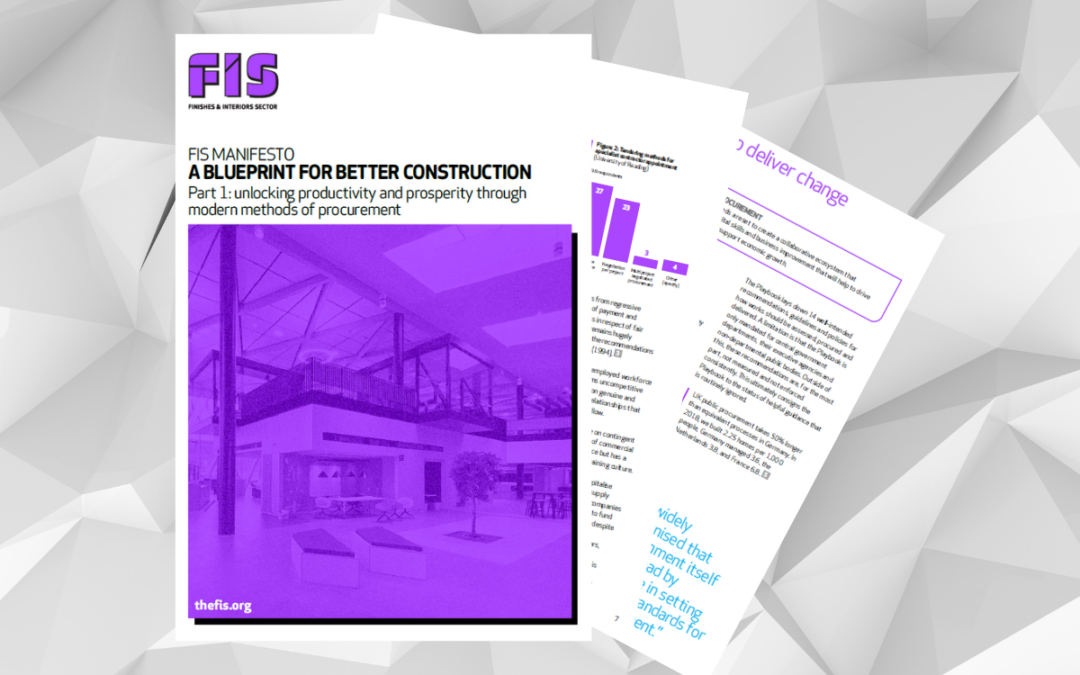
by Clair Mooney | Apr 9, 2024 | Main News Feed
FIS has today issued the first part of the FIS Manifesto, A Blueprint for Better Construction: Delivering Change in the Finishes and Interiors Sector.
This document, the first in a series of three policy documents sets down FIS views on near- and long-term policy levers that will support transformation in the sector. The Manifesto draws heavily on recent research with the University of Reading on Procurement and Contracting, It is less focussed on the macro-economic picture than the Chancellor’s Budget, instead zoning in on the pressing business challenges which beset the specialist construction sector set against four key headings.
- Public Sector Procurement reform led by a more ambitious Construction Playbook. This needs to be backed by a consistent effort to measure outcomes.
- Eliminate unreasonable risk transfer by enforcing standard form contracts that are aligned with supply chain insurance.
- Revisit the Construction Act to simplify payment, reform retention and extend enforcement powers.
- UK Construction Products Marking rules must be aligned to those for other products to support investment in new testing.
Commenting on the launch of this document, FIS President Philip Brown stated:
“This document draws together a lot of work that the FIS team has been doing through our daily engagement with members. For an organisation to have a strong voice, it must carry a strong mandate and this is what we are seeking here. We have a unique opportunity with Building Regulatory Change and an awakening on Sustainability already adding momentum to transformation. Now is the time to rally the construction voice, to unite our community around a number of key simple statements. The main focus is Policy levers, but it should complement our “Empowering the Responsible No” campaign highlighting areas where clients, including Government have unreasonable and damaging expectations that are ultimately undermining the sector.”
FIS CEO Iain McIlwee added:
“This Manifesto draws together the key challenges and policy levers that identified through our research and wider engagement with members. The essence of this document is simple, but we do not underestimate the scale of the challenge.
My hope in setting these points down with explanation and specificity that we are moving beyond the who and why and starting to get into the what, when and how. We will be encouraging members to engage with their local representatives to carry this points forward and will be sharing with officials and politicians as well as colleagues from across construction to ensure our next Government are clear of the actions they need to take to unlock the full potential of our sector and the broader construction industry.”
The manifesto is available to download here

by Clair Mooney | Apr 8, 2024 | Main News Feed
On the day that we learned that the majority of higher risk building Gateway 2 applications were not valid (Regulator: Majority of higher-risk building applications ‘not valid’ | Construction News) the HSE has asked us to remind you that from 6 April projects may need to transition to the Building Safety Regulator (BSR) as the building control authority.
Some projects are eligible to stay under their current building control arrangements, as long as they meet certain criteria. Eligibility for transitional arrangements in building control – Making Buildings Safer
However, if your project:
- Had building control arrangements in place, AND
- Building work (including design work) had started, AND
- A notice that the work had made sufficient progress was not given to the LA by 6 April
OR
- Has started building work but existing building control arrangements cease /are cancelled OR
- Has started building work but there were no formal building control arrangements in place
Then, your project will need to transfer from your existing building control provider to BSR.
You will do this through the portal, which has been adapted to accommodate projects.
New guidance is on its way and we will circulate it as soon as it becomes available.
For more guidance and to register for our new online training visit www.thefis.org/knowledge-hub/technical/fire-protection/building-safety-act/
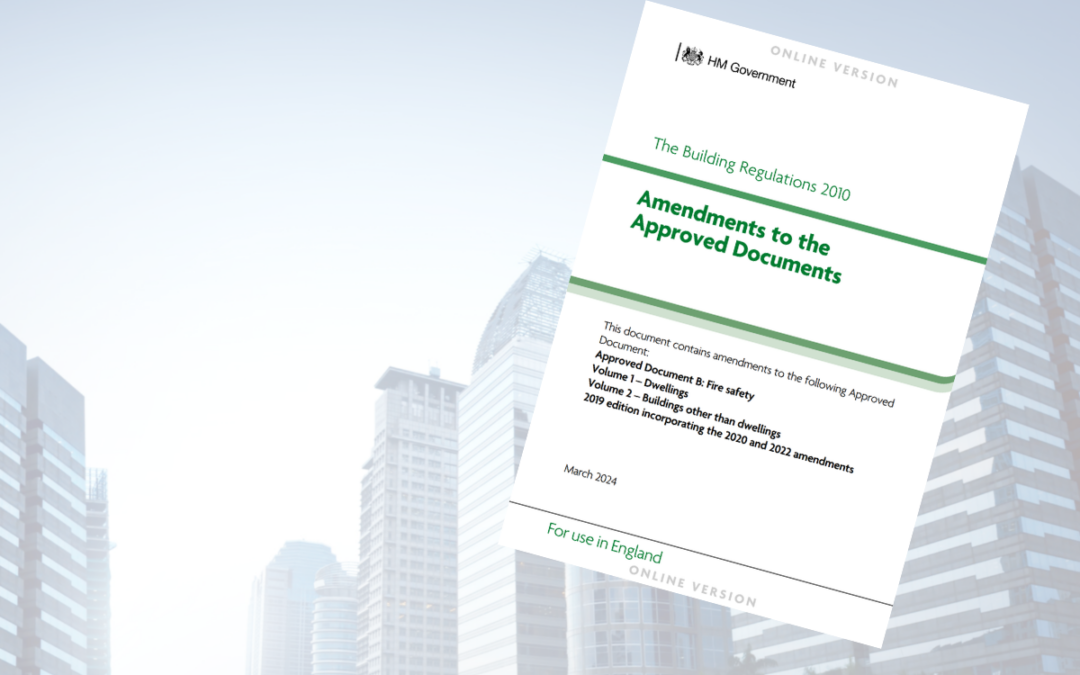
by Clair Mooney | Apr 5, 2024 | Main News Feed
The Government has published a document listing amendments to Volumes 1 and 2 of Approved Document B which will come into effect in September 2026.
These amendments principally concern:
- Threshold for the provision of a second staircase in blocks of flats with a storey 18m or more in height.
- Evacuation shafts are introduced to support the provision of evacuation lifts.
- Changes to provisions for fire doorsets.
- New terminology including definitions for evacuation shaft, evacuation lift lobby, interlocked stair and storey exit.
- Provisions for horizontal escape and vertical escape separated as per the structure of Volume 2.
The 2019 edition incorporating the 2020 and 2022 amendments will continue to apply where a building notice or an initial notice has been given to, or a building control approval application with full plans made to, the relevant authority before 30 September 2026 and either the building work to which it relates:
- has started and is sufficiently progressed before that day; or
- is started and is sufficiently progressed within the period of 18 months beginning on that day
You can view the amendments at the link below:
Fire safety: Approved Document B
FIS will publish further detailed guidance on these changes in the coming months.

by Clair Mooney | Apr 5, 2024 | Main News Feed
Standards are used in our everyday lives to show that products are safe, suitable for a particular use or provide guidance and process, for example many products carry a CE or a UKCA mark to demonstrate their conformity to certain standards, yet access to Standards can be restricted simply by their cost which can run into £100’s, because the National bodies who draft them are part funded by selling them.
We recently covered The European Court of Justice Judgment on providing the free Harmonised standards which are used to define products where CE marking is mandated. We see this as an interesting development and may have repercussions on how Standards are managed moving forwards, in the UK and Europe.
At FIS we strive to make the key standards free to our community via the FIS Standards Portal. It is important moving forwards that we have a robust standard setting body, but the cost to access and use the standards is not prohibitive, particularly for SME’s.
This is just one of the membership benefits. If you are not currently a member and want to know more, please don’t hesitate to contact our Head of Membership Michelle Armstrong michellearmstrong@thefis.org

by Clair Mooney | Apr 4, 2024 | Main News Feed
On 6 April flexible working requests become a day one right for UK employees. This means employees don’t have to have any length of service with your business before they submit a formal request for flexible working arrangements.
FIS member Citation is hosting a webinar on Wednesday 10 April to explain what flexible working actually is and what you need to do to implement these legislation changes.
REGISTER HERE
The webinar will cover:
• What a statutory flexible working request is and who can make one
• What these changes mean for your business and how you can prepare
• How to handle requests, make your decision and update contracts of employment
• An overview of all the other Employment Law changes coming into force across 202

by Clair Mooney | Mar 28, 2024 | Technical
In a recent appeal heard at the European Court of Justice (Case C-588/21 P), the Court ruled that four harmonized standards form part of EU law and access must be freely available without charge.
The Court decided that there is an overriding public interest in free access to harmonized standards that have been cited in the Official Journal of the European Union (OJEU). Although the case related to just four standards, in practice it is likely to apply to future requests for access to all harmonized standards that have been cited in the OJEU.
BSI is now working with CEN, CENELEC and the other members of CEN and CENELEC to understand the implications of the judgment. They will look at how the judgment can be delivered whilst ensuring the future sustainability of the standards system.
If you have any queries on the ECJ ruling please send them to ECJqueries@bsigroup.com
FREE British Standards for FIS SME Members
Sign up now for exclusive access to 100 British Standards. Eligible companies will receive access to the British Standards upon registration.

by Clair Mooney | Mar 28, 2024 | Technical
FIS is aware of two recent reports raised through CROSS (Collaborative Reporting for Safer Structures UK) that highlight potential problems with the application of passive fire protection products.
One issue relates to the use on sealants with CPVP pipes (sprinkler pipe) which can apply to fire stopped pipe penetrations whereby the sealant or firestopping product used can cause failures over time which require repair and downtime of the sprinkler system. Additionally, it is possible that these failures could manifest only at such a time where the active fire suppression systems are required, and that the firestopping at the location of the penetration could itself fail in the event of a fire due to a difference between the site condition and the test condition.
FIS has previously published guidance on this which can be found here, and the CROSS report can be found here.
The second report deals with assumptions being made about the fire protection of steel supporting members within fire rated timber joist supporting floors. In these cases steel beams are not being protected with intumescent coating as it is assumed that the fire resistance of the floor encompasses the steel beams despite the absence of test evidence demonstrating this.
The CROSS report can be found here.
CROSS is a confidential reporting system which allows professionals working in the built environment to report on fire and structural safety issues. These are then published anonymously to share lessons learned, create positive change, and improve safety.

by Clair Mooney | Mar 28, 2024 | CSCS
The CLC has published an updated version of its recommendation on Industry Card Schemes following the introduction of the Building Safety Act and the increased focus on competence.
The CLC recommendation has been adopted across the industry since it was first published in 2015, with the result that cards carrying the CSCS logo are specified and promoted for those undertaking recognised construction occupations. It confirms that CSCS Smart Check should be used to verify that individuals hold the correct card for their occupation and that cards should not be issued for non‐construction related occupations or those visiting sites.
Following the successful rollout of CSCS Smart Check, which enables cards across all 38 card schemes carrying the CSCS logo to be verified using the same platform, CSCS ‘Go Smart’ will be turned off on Sunday 31 March. Cards will not be able to be checked using Go Smart after this date, so members should ensure they have fully switched over to CSCS Smart Check in time, and this recent CSCS webinar outlines the steps to take.
CLC has also launched its Bi‐Annual Review and Plan for 2024 which sets out the CLC’s key priorities for this year, including Building Safety, Net Zero and Biodiversity, Next Generation Delivery, and People and Skills

by Clair Mooney | Mar 28, 2024 | Main News Feed
FIS has been working on a number of fronts looking at how we support the “Responsible No”. As part of this work we have been breaking down the design development process and looking at irreconcilable details. We are looking for member feedback on an outline paper that we have prepared “A Defined Design Development Process”.
This paper looks at the design development process and allocation of responsibility to trade contractors within the context of Contractors Design Portion (CDP).
The transfer of liability in complex amendments to standard form contracts and expectations associated with design development is commonplace. Concern centres on procurement processes (see Figure 1) that give trade contractors little or no time to address design at tender stage and don’t allow for early supply chain engagement and encourage or foster collaboration between specialist contractors.
Increasingly specialist contractors are finding themselves responsible for the compliance of details that they did not design but are presented in contract as their liability. This paper starts to explore how this should be co-ordinated more effectively through a more consistent and consultative design development centred on a standardise approach to creating a Design Responsibility Matrix (DRM).
We would appreciate feedback on this document using this form. Please email to info@thefis.org by 22 April 2024.

by Clair Mooney | Mar 28, 2024 | Employment
The government has announced an increase to the National Minimum Wage and the National Living Wage, which will take effect from 1 April 2024.
These wage increases are significant because:
- the Low Pay Commission has highlighted it as the largest-ever increase to the minimum wage in cash terms
- the age that workers must receive the highest rate of the National Living Wage is being lowered, so it now applies to employees or workers aged 21 or over – it used to only apply to those aged 23 or over.
This effectively gets rid of the old ‘adult’ rate, which used to apply to those aged 21 or 22. The National Minimum Wage is the rate that applies to employees or workers aged under 21 or apprentices.
Those who are entitled to receive the apprentice rate must be aged under 19, or 19 and over and in the first year of their apprenticeship agreement. If an apprentice is 19 or over and has completed the first year of their current apprenticeship, they’re entitled to be paid at least the minimum wage for their age.
What are the new rates?
- Age 21 or over (National Living Wage) – £11.44 an hour (increased from £10.42 an hour or from £10.18 an hour for those aged 21 or 22).
- Age 18 to 20 – £8.60 an hour (increased from £7.49 an hour).
- Age 16 and 17 – £6.40 an hour (increased from £5.28 an hour).
- Apprentices – £6.40 an hour (increased from £5.28 an hour).
It’s important to make sure that pay is increased in line with any birthdays, or work anniversaries for apprentices moving into their second year.

by Clair Mooney | Mar 28, 2024 | Material Shortages
Statement from John Newcomb, CEO of the Builders Merchants Federation and Peter Caplehorn, CEO of the Construction Products Association, co-chairs of the Construction Leadership Council’s Material Supply Chain Group.
As the first quarter of 2024 draws to a close the latest report from Construction Leadership Council’s Material Supply Chain Group (formerly Product Availability Group) continues to show good levels of product availability across the board.
The beginning of 2024 has also brought early signs of improvement in construction activity, although housebuilding is expected to be flat for most of the year.
Overall construction activity trended upward in January and February reaching its highest level since August 2023, despite poor weather. The weather is likely to have affected sales volumes through builders’ merchants, which remained static during the first two months of the year. Most regions, however, saw an increase in volumes in March and there are hints of pent-up demand as a handful of regions are showing high levels of sales compared to 2023.
Prices generally have increased by 3 to 4%, which mirrors the wider economy where CPI inflation in January was 4.0%.
Previous concerns about the impact on products normally transported via the Red Sea seem to have dissipated or are manageable. Although some are experiencing increased shipping costs and slight delays in delivery of ironmongery and sanitaryware this is now described as an ‘inconvenience’, and not a major issue.
Separately, the electro-technical sector has flagged concerns about the ongoing geopolitical risks in East Asia and the potential impact on any construction products, plant and tools with chips sourced from that region. The Group is considering adding this issue to its ‘horizon scanning’ and some members are independently analysing the situation.
However, the availability of skilled labour (outlined in the Group’s report of 20 February 2024) remains the most immediate and pressing concern for most in the Group, with several expressing the view that current market conditions have been masking the true scale of this issue, which will be exposed when the market picks up. The Group has shared these concerns with the CLC’s People & Skills Group where they will be taken up in further detail.

by Clair Mooney | Mar 22, 2024 | Drylining
FIS has launched a revised and updated Best Practice Guide – Installation of Drylining to help promote best practice in the installation of drylining, and to take account of new working practices, the Building Safety Act and sustainability.
First published in 2015 and updated in 2018, this revised guide is an invaluable aid to specifiers, contractors, clients and installers. This publication will guide them through the design and installation of internal, non-loadbearing drylining constructions using gypsum plasterboard on rigid metal framework. It also includes descriptions of other non-plasterboard, such as calcium silicate board, which are also used in drylined systems. This guide includes drylined partitions, linings and passive fire protection.
Split into sections, the revised guide covers everything from the initial tendering and planning stages through to the eventual installation. It offers a series of points to consider when carrying out the installation of all types of drywall and provides updated and revised information including:
The guide sits alongside other FIS Best Practice Guides that relate to drylining:
Commenting on the drylining guides, Iain McIlwee, FIS Chief Executive said:
“Drylining systems form firewalls, fire escape routes and provide passive internal fire protection so it is incredibly important to get it right at all stages of installation and this has to start far earlier and long before boots hit the ground. Our new and updated guides allow professionals to reduce risks, support compliance and most importantly of all encourage responsible planning.”
A valuable resource for improving works package delivery, these guides work well when they are included in proposals and project plans to demonstrate how to best approach a project.
You can download the Best Practice Guide – Installation of Drylining here.
For further information or for any questions and comments please contact the FIS at info@thefis.org or call 0121-707-0077
Page 1 of 5712345...102030...>Last













